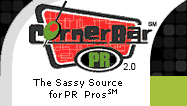
Perfect Pitching
Using Rhythm With Reporters to Avoid Getting Screwed - Part 1
By Richard B. Barger, ABC, APR
Originally Posted
Updated
I was having a drink with a reporter at my favorite CornerBar the other night. He was chain-smoking Camels, downing double Jacks straight up, and holding court on the best flack tricks he'd ever seen -- the ones he'd never repeat to me sober, but that he'd be double-damn sure to use himself if he ever came over to the dark side. Here, as best I can recall, is what he told me:
- The answer. Straightforward, factual. Explanatory, if appropriate.
- "I don't know, but I'll find out the answer and get back to you promptly." Then do it.
- "I know, but I can't tell you that information, because ..." Then explain. You shouldn't have to deal with this latter answer very often, but if the question is about certain legal or SEC issues, proprietary information or trade secrets, or a personnel privacy matter, you have an obligation to protect the information. A few other items may be protected, as well.
- Prepare logical answers to expected questions. Think of likely issues; plan your responses. Relative to the reporter and most of his audience, you are an expert. Be willing to comment on current issues; be a knowledgeable advocate for your company and its industry.
- Always take a moment to gather your thoughts before returning a reporter's call.
- First impressions really count. You do not have a second chance to make a first impression. The research makes clear that the way you "come across" in the first 30 seconds will affect how the audience views your trustworthiness and credibility for the entire interview. Smile and gesture naturally, even for a telephone interview. It works! (For television, gesture at about chest level.)
- Answer the questions asked, but weave your key points into your answers at appropriate times. Make an emotional connection with the audience; use word pictures, anecdotes, stories, analogies.
- Keep your message, your objectives, in mind; think about three or four points you want to make. If the issue is negative, be empathetic, caring, concerned.
- Always be thinking about what you would like the headline of the article -- or the "tease" of a broadcast story -- to say. Make those key points two to four times -- more if possible -- during the interview. This improves the likelihood that the journalist will understand and report crucial information correctly.
- Think "sound bite"; be concise. Except for feature or "profile" interviews, try to answer in 10 to 20 seconds for television and radio, 40 seconds for print. (Practice. It's tougher than you think.) For high-concern issues, the average television interview clip is eight seconds. That's three 12-word sentences!
- Even if the answer is complex, always find a way to simplify for a general audience: Use anecdotes, analogies, metaphors, similes, short stories. But be brief.
- Speak to -- and look at -- the interviewer, not the camera or other parties in the room.
-
The No. 1 Tip: No surprises! Never let your boss, your CEO, or your Board of Directors find out you were interviewed or their organization was featured by first seeing it on the evening news or in the local paper. If contacted by media, let your organization's communications officer and all the key people in your chain of command know at once. If you are not sure of your organization's policies on interviews and publicity, find out!
-
Media: Friend or foe? It really doesn't matter. If you are cooperative and responsive, the media can be valuable allies. But, even if they're not friendly for some reason, they're still there. You have to deal with them. They serve a valid function in our system.
-
Media are not your publicity agents. They have specific agendas and assignments and editorial requirements. You won't like everything they do. However, if you're dealing with responsible journalists, they will strive to be evenhanded through time. No organization has a right to favorable coverage, but you have every right to expect -- and demand -- balanced treatment. If that doesn't happen, go to the reporter before you go to the reporter's boss or editor.
-
Work to develop ongoing relationships with reporters, so the previous point won't be an issue. Try to understand their jobs and their needs, and help meet those needs. Position yourself as a source of information -- on your unit and organization and, in particular, on important industry issues. If you have additional subject matter expertise, make sure the local media know it. Have them call you as a resource when they're doing almost any industry story; if you're not the best source, help them locate a good one. It is perfectly appropriate for you to be a strong advocate for your profession or industry and to have thought through your own agenda.
-
There are only three acceptable answers to any question:
-
Media's deadline is your deadline. Be knowledgeable, accessible, responsive.
-
A little preparation goes a long way. It not only is permissible, it is essential to have your own agenda, your own objectives. If a reporter calls, you'll be prepared.
My friend was beginning to flag, when he said, "And don't forget Tip No. 1!" and wobbled off toward the gent's room. This interruption seems like a good place to take a break, so I'll save the rest of his enlightened -- and enlightening -- comments for next time. Tune in then and see President Bartlett abuse a reporter.

